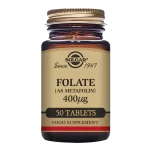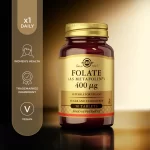





Folate (Metafolin) 400mcg Solgar
£9.19 – £16.39
Folate (Metafolin)
Folate (Metafolin) , also known as vitamin B9, is a water-soluble B vitamin that plays a crucial role in various physiological processes within the body.
It’s particularly important for cell division and the synthesis of DNA and RNA. Folate is essential for the growth and maintenance of cells, making it especially important during periods of rapid cell division and growth, such as pregnancy and infancy.
One of the most well-known functions of Metafolin is its role in preventing neural tube defects during fetal development. Neural tube defects are serious birth defects that affect the brain and spinal cord of the developing fetus.
Adequate folate intake before and during pregnancy is essential for preventing these defects.
In addition to its role in preventing birth defects, folate is also important for several other functions, including:
1. **Cell Division and DNA Synthesis:** Folate is essential for the synthesis of DNA, RNA, and proteins. This is important for the proper growth and maintenance of cells throughout the body.
2. **Red Blood Cell Formation:** Folate is involved in the formation of red blood cells. A deficiency in Metafolin can lead to anemia, a condition characterized by a reduced number of red blood cells and reduced oxygen-carrying capacity of the blood.
3. **Homocysteine Regulation:** Folate, along with vitamins B6 and B12, helps convert homocysteine, an amino acid, into other substances. High levels of homocysteine in the blood have been associated with an increased risk of cardiovascular disease.
4. **Cognitive Function:** There is some research suggesting that adequate folate intake may be beneficial for cognitive health and may play a role in supporting memory and cognitive function, especially in older adults.
Good dietary sources of folate include leafy green vegetables (such as spinach and kale), legumes (such as lentils and beans), citrus fruits, avocados, and fortified grain products (such as fortified cereals and bread).
In some cases, supplementation with folic acid (the synthetic form of folate) might be recommended, particularly during pregnancy or for individuals who have a higher risk of deficiency.
It’s important to note that while folate deficiency can have serious health implications, excessive intake of folic acid from supplements can also have adverse effects.
Balancing your folate intake through a varied and balanced diet is generally the best approach, and consulting with a healthcare professional before making significant changes to your diet or supplement regimen is advised.
Folate (as Metafolin) 1000 mcg , the body ready form of Folic Acid is a high strength B Vitamin and contributes to several processes within the body, with the most well-known one its support of maternal tissue growth during pregnancy.
Folic acid is a supplement which is advise to take by pregnant women and those trying to conceive.
It can be found in different foods, such as dark green leafy vegetables, but to make sure you reach the adequate level of intake, especially before and after conception, taking a supplement is highly recommended.
Folate Deficiency
This important B Vitamin also regulates healthy homocysteine levels and contributes to energy levels and general wellbeing.1 tablet of Folate 1000 mcg will contribute to:
- Maternal tissue growth during pregnancy
- Normal amino acid synthesis
- Normal blood formation
- Homocysteine metabolism
- Psychological function
- Normal function of the immune system
- Reduction of tiredness and fatigue
- The process of cell division
















Reviews
There are no reviews yet.